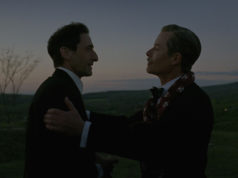
If Ken Russell hadn’t existed, the 1970s would surely have invented him. The 84-year-old British filmmaker passed away on Monday, quietly in his sleep. That sounds wrong, doesn’t it? A guy like that should have gone out in the manner of a character in his films, in a great heaving rush of heroic passion, accompanied by tremendous orchestral swells and a torrent of lurid, flowery, swirling visuals. The film critic Dilys Powell famously called Russell “an appalling talent,” and oh, was that ever true.
Russell is best known in America as the director of Tommy, the film version of The Who’s rock opera. His career encompassed much more than that, though. He came to prominence in 1969 with an adaptation of D.H. Lawrence’s Women in Love. The film drew attention for a climactic nude wrestling scene between the two major male characters (played by Alan Bates and Oliver Reed), which would still be a daring move for a film made today. That, however, was only the crowning touch on a terrific match between the material and the filmmaker, whose lush visual style and rebellious attitude dovetailed perfectly with Lawrence’s world-view.
This gave way to the High Russell period, characterized by three wildly inaccurate biographies of classical composers. His 1970 work The Music Lovers treated Tchaikovsky’s homosexuality openly, which couldn’t have been in greater contrast to a previous generation of Hollywood music bios that sanitized their subjects’ lives beyond all intelligibility like A Song to Remember (Chopin) and Song of Love (Schumann). Unfortunately, Russell’s treatment of Tchaikovsky’s life only trafficked in a different set of romantic clichés about a misunderstood artist constrained by repressive bourgeois society whose music is merely a product of his homosexual guilt. (Richard Chamberlain portrayed Tchaikovsky, and it’s fascinating to watch the movie now, knowing he was secretly gay back then.) Russell’s other music bios, Mahler and Lisztomania, document him toppling over into self-parody and kitsch. Someone should have told him that casting Roger Daltrey as Liszt was a bad idea. Then again, it was the ’70s.
Also belonging to this period is The Devils, which has been commercially unavailable for many decades because of its incendiary subject matter about a group of sexually repressed 17th-century nuns. A mere description of the plot gives you an idea of why the film was legally banned in Britain — naked nuns rubbing up against a Jesus statue would get a filmmaker into hot water today, too. The film has had a tortured history on video, but it was just recently announced that an uncensored, uncut version would be released on DVD in March.
On the opposite end of the spectrum from The Devils is his musical The Boy Friend from the same year, 1971. The film is set at a run-down London theater that’s putting on the trifling Sandy Wilson stage musical on which the film is based. The movie attempts a meta-commentary on the musical genre and in doing so inflates the play into a garish, overlong mess. Still, lead actress Twiggy, then at the height of her modeling career, proved that she could act and sing in this movie, and we also get an early look at Wichita Falls native Tommy Tune as a gangly American dancer who’s part of the show. Wilson’s songs remain engaging, and the “Safety in Numbers” number features dancers spinning while dressed up as giant dice, no easy feat when the costume immobilizes your arms.
The Guardian has an awesomely headlined article interviewing Russell’s collaborators, while elsewhere on their site, Tom Service pays tribute to Russell’s unique glam-classical musical sensibility. The A.V. Club has an excellent obituary of him as well. The films above are the essential Russell. Dumb and in bad taste though they frequently were, they’re still not like anything else out there.













Thanks but I’m not really seeing how almost 3 dozens works on the greatest artists of the past 300 years can be deemed “frequently dumb”.
The films above are NOT the essential Ken Russell. You left out Savage Messiah (which had zero glitz or opera in it), Whore (Ken’s very honest response to the Pretty Woman/Hollywood hooker chic c) and (sin of sins) you left out ALL his work with monitor and the BBC!!
“but it was just recently announced that an uncensored, uncut version would be released on DVD in March. ”
Incorrect. The issue will be the 111 minute UK cut.
With all due respect, please see a more films and do more reading . Shade Ruper at Indie Wire wrote thee best obituary thus far. Cheers!
Ken Russell Forever.
*Shade Rupe*